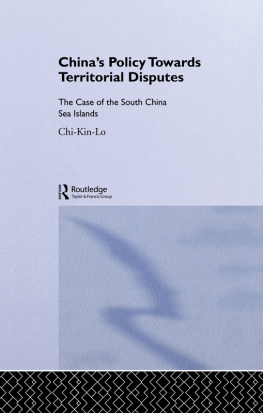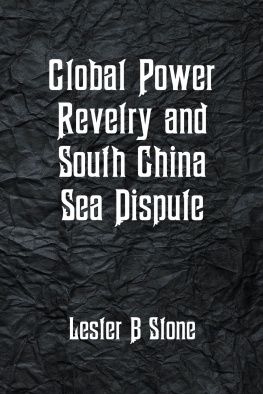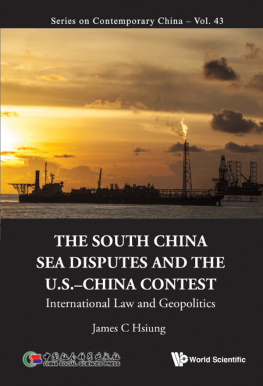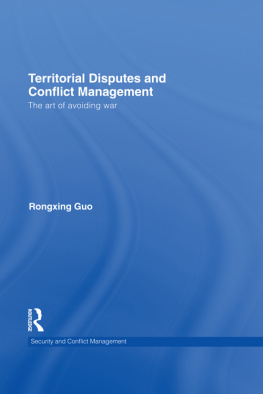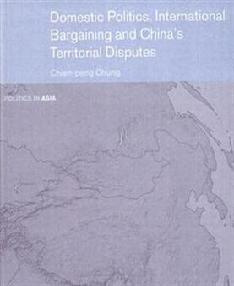CHINAS POLICY TOWARDS TERRITORIAL DISPUTES
Since 1949 and the founding of the Peoples Republic, Chinas boundaries have been relatively ill-defined and territorial disputes have provided a potent source of conflict in Chinas relations with its neighbours. The Sino-Soviet and Sino-Indian disputes of the 1950s and the 1960s ended in stalemate, but a new arena of conflict has developed in the 1970s and 1980s: the Paracel and Spratly Islands, with their potentially rich and accessible petroleum resources.
This book, based on a wealth of primary materials in the Chinese language, is the first to make a thorough and overall investigation of Chinas policy towards these islands. It discusses the battle against South Vietnam for the Paracels in 1974; the war with Vietnam over the Spratly Islands in 1987; the conflicts with the Philippines and Malaysia; and the relationship between the territorial dispute and Chinas maritime claims in the South China Sea. The book also discusses the influence of Chinas policy towards territorial disputes in general.
The Author. Chi-kin Lo is Managing Editor of the Ming Pao Daily News, Hong Kong.
International Politics in Asia Series
Edited by Michael Leifer, London School of Economics
China and the Arms Trade
Ann Gilks and Gerald Segal
Soviet Foreign Policy in Southeast Asia
Leszek Buszynski
ASEAN and the Security of South-East Asia
Michael Leifer
CHINAS POLICY TOWARDS TERRITORIAL DISPUTES
The Case of the South China Sea Islands
CHI-KIN LO
First published 1989
by Routledge
2 Park Square, Milton Park, Abingdon, Oxon, 0X14 4RN
270 Madison Ave, New York NY 10016
Transferred to Digital Printing 2005
1989 Chi-kin Lo
All rights reserved. No part of this book may be reprinted or reproduced or utilized in any form or by any electronic, mechanical, or other means, now known or hereafter invented, including photocopying and recording, or in any information storage or retrieval system, without permission in writing from the publishers.
British Library Cataloguing in Publication Data
Lo, Chi-kin 1958
Chinas policy towards territorial
disputes: the case of the South China
Sea islands. (Politics in Asia series).
1. South China Sea. Islands. Territorial
claims. Disputes. Policies of Chinese
government. China. Government
I. Title II. Series
341.42
ISBN 0-415-00927-8
Library of Congress Cataloging in Publication Data
Lo, Chi-kin.
Chinas policy towards territorial disputes: the case of the South China Sea Islands / Chi-kin Lo.
p. cm. (Politics in Asia series)
Based on the authors thesis (Ph. D. London School of Economics and Political Science, 1986)
Includes index.
Bibliography: p.
ISBN 0-415-00927-8 (U.S.)
1. Paracel Islands International status. 2. Spratly Islands International status. 3. China Foreign relations 1976-
I. Title. II. Series.
JX4084.P28L8 1989
For Bik-may
Acknowledgements
This book is based on the Ph.D. thesis that was completed during my study at the London School of Economics and Political Science from 1984 to 1986. I am indebted to my supervisors, Dr. Michael Leifer and Mr. Michael B. Yahuda, for their supervision of my research and invaluable advice on the contents of my thesis.
Special thanks are due to my wife, Bik-may. She has not only given me love and support that were so much needed during the years of research, but has also made immense contribution to the preparation of this book.
Lo, Chi-kin
July 1988
Hong Kong
Chapter One
Introduction
With the founding of the Peoples Republic (PRC) in 1949, one of the most important historical legacies inherited by the new government was the relatively ill-defined boundaries of China. It has been noted that (t)he traditional frontiers of the Chinese empire were often not lines but zones of intermixture between Chinese settlements and the customary habitats of nomadic peoples owing a vague allegiance to the Chinese emperor. (1) Even taking into account the boundary treaties and treaties of cession of territories that foreign powers had imposed during the nineteenth century, Chinas boundaries were far from well-defined when the Communist Party assumed power. The status of the boundaries was made even more uncertain by the decision of the new Chinese government to reserve for itself the right to recognize, abrogate, revise, or renegotiate those treaties and agreements concluded between the Nationalist Chinese government and foreign governments.(2) In practice, as the territorial disputes during the 1950s and the early 1960s revealed, China adopted a similar approach towards those unequal treaties signed between Qing (Ching) China and foreign powers in the nineteenth century, although this position was not explicitly stated until 1963. (3)
Despite a number of boundary agreements that were signed in the early 1960s, disputes over many parts of Chinas boundaries have remained unsettled. In fact, since 1949, China has quarrelled with nearly every one of its neighbours over disputed territories. The significance of territorial disputes for Chinas relations with its neighbours has been underlined by the major military operations that it has undertaken in disputed territories: over the Sino-Indian border in 1962? over the Sino-Soviet border in 1969; and over the Paracel Islands in 1974.(4) To date, territorial dispute has remained a potent source of conflict in Chinas difficult relations with its major neighbours--the Soviet Union, India, and Vietnam.
As a consequence, territorial dispute has been an important area of investigation for students of Chinas foreign relations. Considerable academic interest has been attracted to a number of questions concerning Chinas policies towards territorial disputes. What are the factors which have played a major role in these policies? Why did China undertake military operations to assert its territorial claims in some instances but not in others? Were these operations simply dependent on Chinas capabilities and the local military balance? Why has China displayed different attitudes towards different disputes at the same time and different attitudes towards the same dispute at different times? (For example, during the early 1960s, China treated the territorial dispute with India in a different manner from territorial disputes with other Himalayan countries. And Chinas attitude towards the territorial dispute with India itself underwent significant changes from the mid-1950s to the early 1960s.) Have these differences been simply due to variations in local circumstances, or differing behaviour on the part of the contending parties?
The overall objective of this research is to pose the above questions with particular reference to the territorial disputes over the Paracel and Spratly Islands in the South China Sea. Although there are a large number of existing studies of Chinas policies towards territorial disputes, most of them are based on research into the Sino-Soviet and Sino-Indian border disputes. Since the early 1970s, these disputes have entered into a state of stalemate and, as I shall point out below, the disputes over the Paracel and Spratly Islands have become the major active territorial issue for China. A study of Chinas handling of these disputes during the 1970s and the early 1980s should therefore improve our general understanding of Chinas policies towards territorial disputes and may even shed new light on these policies.


